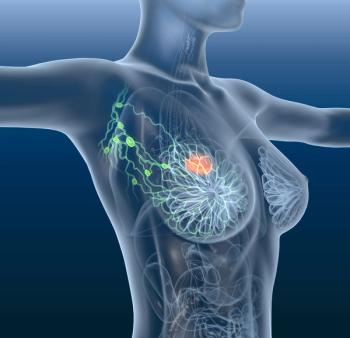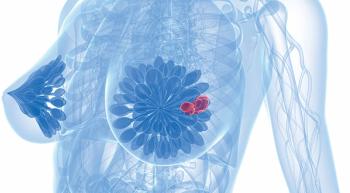
HER2-Positive Breast Cancer
Latest News
Latest Videos

CME Content
More News

The importance of forming partnerships with patients and understanding their preferences for therapy when establishing treatment algorithms for patients with HER2-positive metastatic breast cancer.

Sara A. Hurvitz, MD, and Julia A. LaBarbera, NP, of UCLA, highlight the safety and efficacy profiles of newer novel treatment options available for HER2-positive breast cancer and brain metastases.

Findings from a meta-analysis indicated that pathologic complete response is a notable predictor of outcomes in HER2-positive breast cancer.

Variables that impact decisions to treat HER2-positive breast cancer and brain metastases with radiation therapy and systemic therapy, and recommendations on using memantine following radiation therapy.

Treatment recommendations for patients with HER2-positive metastatic breast cancer, like Erika Rich, upon identification of lesions in the brain.

Adverse events commonly associated with chemotherapies used to treat HER2-positive metastatic breast cancer, and recommendations to help equip patients with knowledge about what to expect during their treatment journey.

Erika Rich, a patient with HER2-positive metastatic breast cancer, explains why she opted to pursue a second opinion about her diagnosis and treatment options and proactively research her disease.

A panel of experts led by Sara Hurvitz, MD, discuss recent data within the HER2-positive breast cancer treatment landscape.

Recommendations for deciding what information is most important to discuss with patients during initial treatment planning for HER2-positive metastatic breast cancer.

Julia A. LaBarbera, NP, reacts to the treatment approach used for a patient with HER2-positive metastatic breast cancer, and highlights the benefits of new subcutaneous injections of trastuzumab and pertuzumab that are available.

The inaccuracy of standard immunohistochemistry testing to identify ERBB2-low breast cancer could lead to real-world mismanagement of patients who may be eligible for fam-trastuzumab deruxtecan-nxki.

Patients with HER2-low metastatic breast cancer achieved clinically meaningful improvement in progression-free survival following treatment with fam-trastuzumab deruxtecan-nxki.

Advice for community physicians treating HER2+ breast cancer.

The phase 2 PERMEATE trial yielded positive results in the combination of pyrotinib plus capecitabine in patients with HER2-positive breast cancer and brain metastases.

Dr. Virginia Kaklamani discusses the role of maintenance therapies for HER2+ breast cancer.

Virginia Kaklamani, MD, DSc, provides an overview of the goals of care for HER2+ breast cancer.

Patients with HER2-positive breast cancer who were treated with trastuzumab deruxtecan experienced favorable activity and reduction or loss of HER2 expression.

A review of the currently available frontline treatment options for HER2+ breast cancer.

Virginia Kaklamani, MD, DSc, provides an overview of the goals of care for HER2+ breast cancer.

Fam-trastuzumab deruxtecan-nxki, which was granted a priority review designation, appears to have potential for patients with HER2-positive unresectable/metastatic breast cancer.

Research suggests a new HER2DX assay is potentially able to accurately predict risk of recurrence for patients with early-stage HER2-positive breast cancer.

Experts provide clinical pearls to the audience on treating patients with breast cancer.

The panelists share their insights on managing toxicities and special considerations in the treatment of HER2+ breast cancer.

Experts discussed the changing landscape in treatments for HER2-positive metastatic breast cancer.

Patient data from 4 clinical trials suggests HER2-low–positive tumors can be seen as a new breast cancer subgroup, specifically distinct from HER2-zero tumors.






































